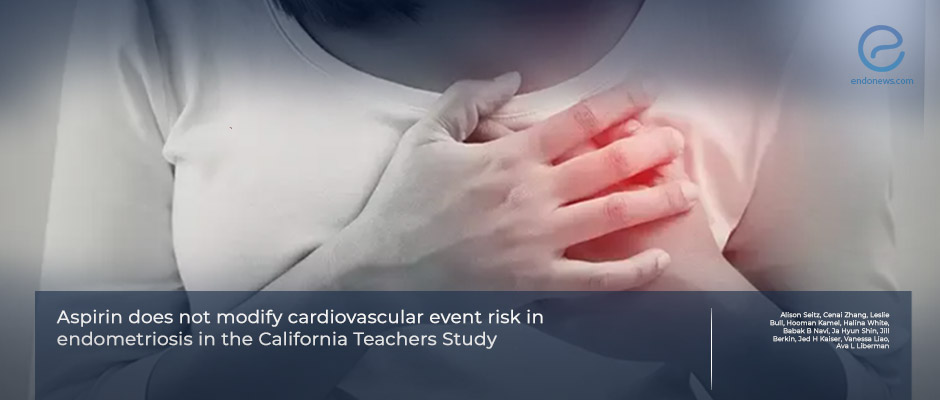Aspirin Fails to Alter Cardiovascular Risk in Endometriosis
Oct 31, 2025
A 25-year study finds that women with endometriosis remain at elevated cardiovascular risk despite aspirin use.
Key Points
Highlights:
- Women with endometriosis had a significantly higher risk of major adverse cardiovascular events (MACE), including stroke and coronary heart disease.
- Regular aspirin use did not reduce cardiovascular event risk in women with endometriosis.
- The highest relative cardiovascular risk occurred in women younger than 40 years old with endometriosis.
Importance:
- Endometriosis is increasingly recognized as a systemic inflammatory condition with long-term vascular implications.
- Given aspirin’s anti-inflammatory and antithrombotic properties, it was hypothesized to reduce cardiovascular risk in women with endometriosis.
- This study provides large-scale, longitudinal evidence that standard aspirin prophylaxis may not be effective for this specific population.
What's Done Here:
- The data from the California Teachers Study, a 25-year prospective cohort (1995–2020) was analyzed..
- The analysis included 120,435 women, of whom 13,754 (11.4%) reported a history of endometriosis.
- Cardiovascular outcomes were defined using validated hospital records for stroke, myocardial infarction, and coronary heart disease.
- Statistical analysis used inverse probability weighting to model causal associations between endometriosis, aspirin use, and cardiovascular events.
Key Results:
- Women with endometriosis had a 10% higher overall risk of MACE than those without.
- The risk was 48% higher among participants younger than 40 years.
- Aspirin use did not modify this risk.
- Risks were elevated for stroke and coronary heart disease, but not for myocardial infarction.
Limitations:
- Endometriosis and aspirin use were self-reported, and dosage or indication data were not available.
- The cohort was predominantly non-Hispanic White women, limiting generalizability.
- The observational design precludes establishing causality and may include unmeasured confounder.
From the Editor-in-Chief – EndoNews
"This large-scale, long-term study delivers an important message: the vascular risk associated with endometriosis is real, but aspirin is not the answer. The findings emphasize that the mechanisms linking endometriosis and cardiovascular disease extend beyond platelet aggregation or classic inflammation. Instead, endothelial dysfunction, estrogen signaling imbalance, and chronic systemic inflammation may collectively shape this risk profile.
The absence of benefit from aspirin challenges conventional cardiovascular prevention strategies and calls for disease-specific cardiometabolic research in women’s health. Clinicians should recognize endometriosis as a multisystem condition with implications far beyond the pelvis and adopt proactive screening for hypertension, dyslipidemia, and metabolic changes early in life.
Ultimately, this study underscores the need to move past generic therapies toward precision approaches that address the unique inflammatory and hormonal pathways of endometriosis-related cardiovascular risk."
Lay Summary
Aspirin, often recommended for heart protection, may not help women with endometriosis avoid cardiovascular disease.
In a 25-year study of more than 120,000 women from the California Teachers Study, researchers from Weill Cornell Medicine in New York, and the University of Washington in Seatle found that women with endometriosis were more likely to experience heart attacks, strokes, or other major cardiovascular events, particularly before age 40.
However, regular aspirin use did not reduce these risks. Even among long-term users, the chance of developing cardiovascular complications was similar to those who did not take aspirin.
The authors, led by Dr. Ava Liberman, suggest that the mechanisms linking endometriosis to heart disease may differ from traditional cardiovascular pathways that aspirin targets.
Published in the European Heart Journal Open, the study emphasizes the need for personalized cardiovascular prevention for women with endometriosis and calls for further research to explore alternative protective strategies tailored to their unique inflammatory and hormonal profiles.
Research Source: https://pubmed.ncbi.nlm.nih.gov/40370503/
Cardiovascular Aspirin Stroke Coronary heart nflammatory Women’s health Vascular risk Preventive cardiology

